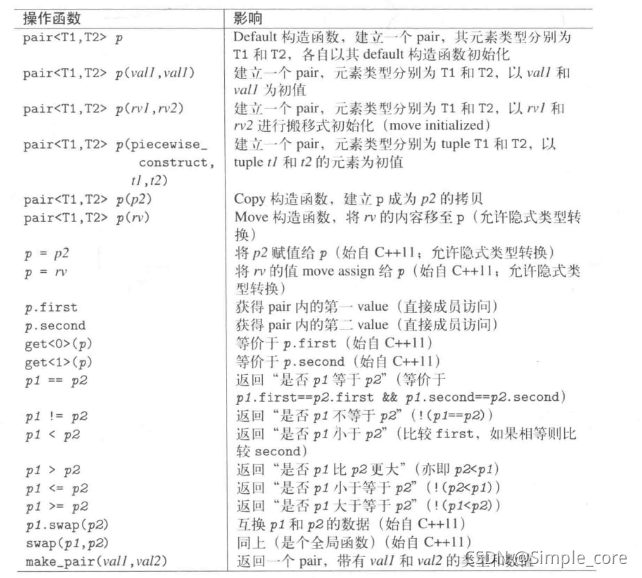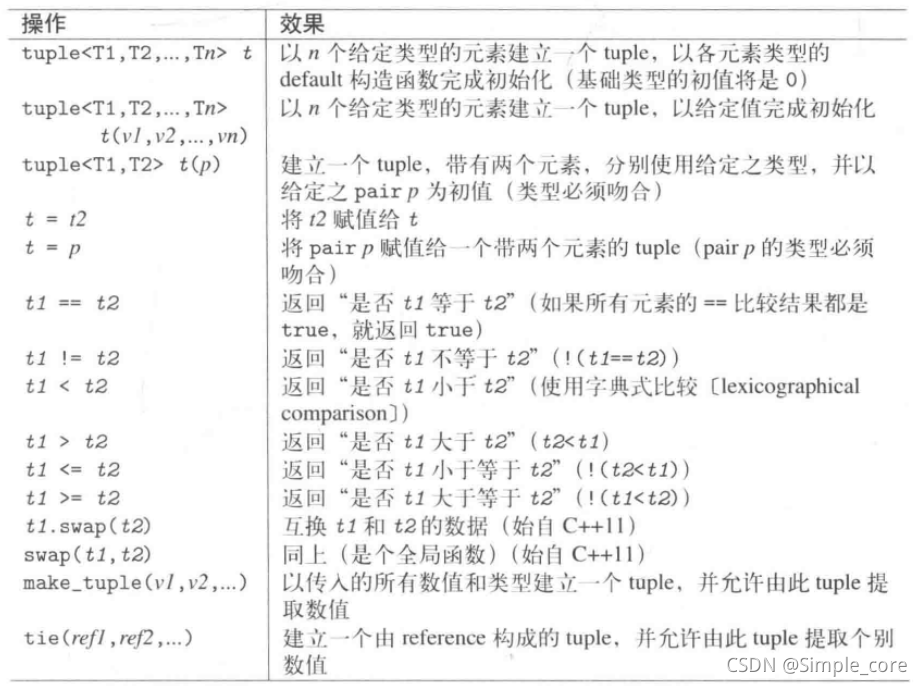对pair和元组tuple
pair常见的操作函数

测试:
//pair
void test01()
{
int i = 0;
auto p = std::make_pair(std::ref(i), std::ref(i));
++p.first;
++p.second;
cout << i << endl;
std::pair<char, char> pp = std::make_pair('x', 'y');
char c;
std::tie(std::ignore, c) = pp;
cout << c << endl;
//说白了pair就是两个值绑定到一起,只要能够访问到这两个值就行,piar也是一个模板的函数,可以存放的数据的类型也是不限制的,可以放类,string,int等等。
//可以使用first和secend访问到他的值
}
元组的函数
元组是什么,元组就是存放不同的数据类型,不想vector那样,存放的数据的类型必须是一致的,存放了一个学生类,后面的数据也必须是学生类,tuple不同,可以存放不同的数据类型,有了这个之后可以方便我们使用,比如,一个小的结构体数据可以使用元组代替了。

测试:
//tuple元组
void test02()
{
tuple<string, int, int, complex<double>> t;
tuple<int, float, string>t1(41, 6.0, "nice");
cout << get<0>(t1) << " "<< get<1>(t1) << " "<<get<2>(t1) << " " << endl;
auto t2 = make_tuple(22, 44, "nico");
//get<1>(t1) = get<1>(t2);
if (t1 > t2)//比较的是每一个值
{
t1 = t2;
}
cout << get<0>(t1) << " " << get<1>(t1) << " " << get<2>(t1) << " " << endl;
//修改tuple中的一个值
std::string s;
auto x = make_tuple(s);
std::get<0>(x) = "my value";
auto y = make_tuple(ref(s));
std::get<0>(y) = "my value1";
cout << get<0>(y) << endl;
cout << get<0>(x) << endl;
std::tuple<int, float, std::string>tt(77, 11.22, "test test");
int i;
float f;
std::string ss;
std::make_tuple(std::ref(i), std::ref(f), std::ref(s)) = tt;
std::tie(i, f, ss) = tt;
//获取元素个数
//拼接
int n = 99;
auto tp=tuple_cat(std::make_tuple(42, 6.5, "world"), std::tie(n));
cout << get<0>(tp) << " " << get<1>(tp) << " " << get<2>(tp) << " " << get<3>(tp) << endl;
}
版权声明:本文为simple_core原创文章,遵循 CC 4.0 BY-SA 版权协议,转载请附上原文出处链接和本声明。